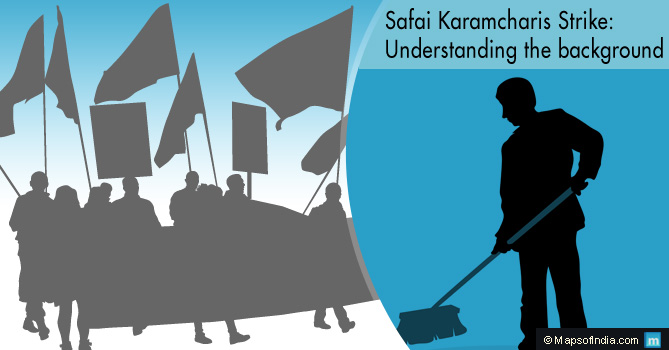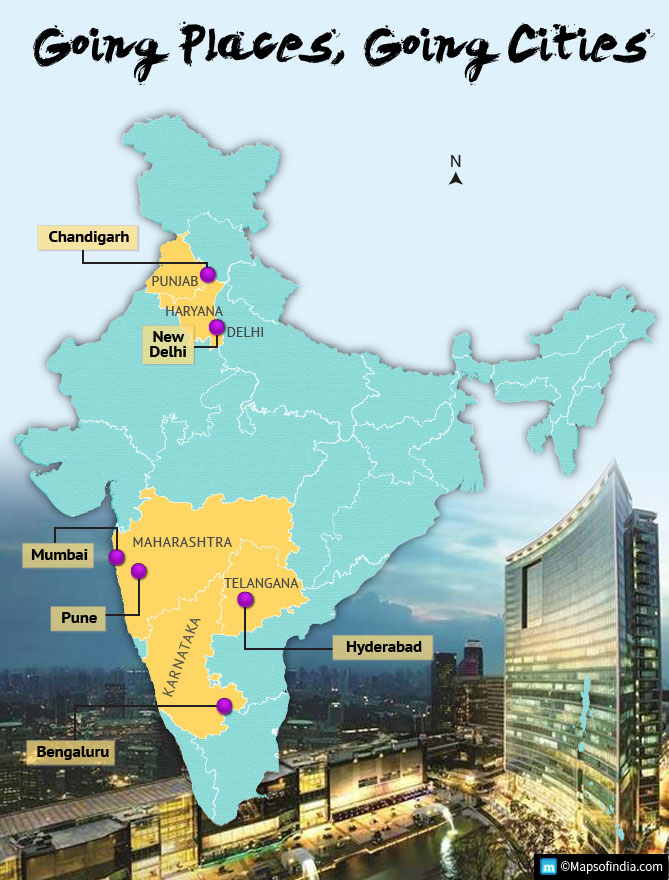Delhi sanitation workers, also known as Safai Karamcharis, have decided to go on strike once again from 26 June onwards to protest against the Delhi government’s failure to meet their long pending demands. Earlier, 30,000 safai karamcharis of East and North Delhi Municipal Corporation had struck work from 2 June onwards and only called off their strike after the Delhi High Court’s intervention directing the Delhi Government to ensure release of their salary dues by 15 June.
So what is prompting the Sanitation workers of Delhi to strike work and why is the Delhi government not meeting their demands when it publicly announced accepting them?
There is no question that most of the demands of the sanitation workers are legitimate and therefore the reason of their earlier strike and threat to resume it once again, may seem justified. However, there are deeper issues involved here and one has to understand the background before condemning any of the stakeholders for being responsible.
Reality check
When Delhi was still a Union Territory, the administration was the responsibility of the centre and hence the command structure for day-to-day administration did not face ambiguity. At the time, Delhi was mostly maintained by the Municipal Corporation of Delhi (MCD) which had 8 districts under its jurisdiction, with the rest falling under New Delhi Municipal Council (NDMC) and the Delhi Cantonment Board.
After becoming a state, under the Sheila Dikshit administration MCD was split into three bodies:
• North Delhi Municipal Corporation
• South Delhi Municipal Corporation
• East Delhi Municipal Corporation
It must be understood that while Delhi is a state, it does not enjoy full administrative powers as is the case in other states. As a result there is ambiguity over role and responsibility between the state administration and central government. The recent controversy regarding appointment of senior IAS officers in the Delhi administration was a result of conflict between the two, the base reason being politics and ego clash between the Chief Minister and the Lieutenant Governor.
Currently, AAP is the ruling party in Delhi but the Chief Minister has restricted powers in administrative matters, with the crucial law & order responsibility lying with the central government. Interestingly, the BJP which is in power at the centre, does not have a fair share of seats in the Delhi Assembly but has a majority in all three arms of former MCD, as mentioned above.
This means that while BJP has the dominant voice on policy matters pertaining to fund allocation, operations and management of the three municipal arms, the overall responsibility still comes under the state administration where AAP is the ruling party. Congress party may have fared badly in the state polls but it still has a significant presence in all three arms of former MCD, holding the second largest number of seats after the BJP.
The problem
Despite raising and paying over Rs 1.25 lakh crore in taxes to the centre every three months, the state government of Delhi receives a paltry Rs 2000 crore from the centre. This is clearly insufficient to meet existing expenses, which means that the municipal corporations in Delhi have to either raise more taxes and revenues from other sources or curtail their existing expenditure through cost cutting and more efficient deployment of funds. The solution may lie in a bit of both, however, politics kicks in amongst all stakeholders, AAP in Delhi, BJP at the Centre, and the local BJP in the three municipal corporations, while the safai karamcharis happen to be caught in between.
Are the demands of the Safai Karamcharis justified?
Well, at the time of going on strike on 2 June, salary for April, May and June was yet to be paid. While middle class and upper class Delhi squirmed at the ugly sight of having garbage piled up on the streets, imagine how they would have reacted if their salaries had not been paid for just one month. What with all the pending school fees, EMIs and other financial commitments, and if it got stretched to two months, there would be pandemonium outside the PM’s gate, so when 30,000 safai karamcharis strike work to demand what is due to them for the last three months, they stand justified.
Could the state government have responded earlier and not let the situation reach a point where the worker’s had to go on strike?
They could have but Arvind Kejriwal’s government just didn’t have the funds and had to wait for the centre to release funds. Thanks to Delhi High Court’s timely intervention directing the Delhi government to release the due salary for the months of April, May and June. On 11 June, the Delhi government confirmed release of Rs 513 crore in total, with Rs 333 crore being released to North Delhi Municipal Corporation and Rs 180 crore being transferred to East Delhi Municipal Corporation. And this is where politics becomes more visible. While the three municipal corporations claim that all dues have been paid, the safai karamcharis claim that full payments are yet to be released.
Their other demands have been to release the Child Education Allowance, regular payment of salaries within the first week of every month, release of arrears to those employees who were regularised in 2003 and 2004 and provision for accessing cashless medical facilities. These are all genuine demands.
Is AAP losing its appeal?
One of the largest segments that have remained loyal to Arvind Kejriwal and his party have been the employees of MCD. They not only voted the first time for AAP but contrary to national trends, voted AAP back into power with a massive mandate. By not getting its administrative act together and further compounding the situation with a confrontationist attitude with the centre, AAP has placed itself in a corner by not getting any support from either the BJP or Congress.
Seeing the opportunity to get back lost ground in Delhi, Rahul Gandhi has been quick to offer support to the agitating workers, while the BJP is taking a back seat and waiting for the heat to gain ground between the workers and the Delhi government. Meanwhile, the centre continues to watch from the bylines since it’s a state problem.
In the end, it’s the poor safai karamcharis that have to fend for themselves and now 28 worker unions have come together in a show of unity and have given a joint call for another strike from 26 June onwards. This time, they say, the agitation will carry on till their demands are not just agreed upon but met.
Without funds, Arvind Kejriwal and his administration have a situation in hand.






